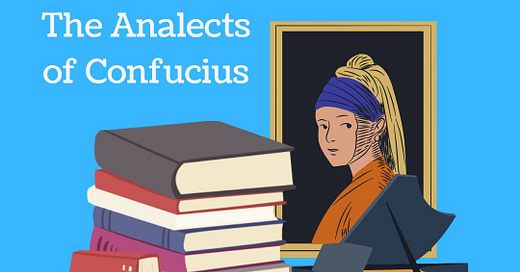After last week’s high of The Odyssey, this was the reading equivalent of a cold plunge. Confucius’ Analects was my reading this week, accompanied by Chinese traditional music and art. I’ll probably be better off for having read it, but I did not enjoy it at all.
First, The Analects is a lot like the book of Proverbs in the Bible: aphorism after aphorism, with very little narrative and not much to connect each paragraph. This year in my Bible in a Year reading program, I read Proverbs straight through. It was actually the only time I nearly gave up. There was not a lot of room to ponder the thoughts, and the feeling was truly like drinking from a firehose. That’s exactly how I felt this week, trying to get through the book.
Second, there are numerous characters referenced, and the notes (I used Alfred Whaley’s translation) are helpful, but frankly the entire history surrounding Confucius feels completely foreign, making it tedious to try to get the deeper meaning in these sayings. And sometimes I just felt like I was in a fortune cookie factory.
I did, in fact, try to put together a few cogent thoughts about The Analects itself, ideas I can take forward with me into further reading:
The most important virtues for Confucius are courage, wisdom, and Goodness. Goodness is embodied as adherence to type. Whaley’s description (from 1938, if that helps) is that it’s like calling someone a “true Englishman” as the best compliment. It is attainable by aligning yourself with it rather than chasing it.
Ritual is supremely important. Adherence to ritual is necessary to attain the Way of the Good (which is the Ancient, and better way) rather than the Way of Violence (which is the current-day way). Further, respect for parents is a crucial part of ritual.
There is a tension between the life of the mind, which is what a gentleman is to develop, and the practical life, which is for common people. Confucius says more than once that a gentleman doesn’t pursue practical knowledge but only contemplates ideas.
I saw parallels with Stoicism occasionally, and there was some Utopianism, it seems to me. There were also plenty of times when it struck me that Confucius was actually complaining that even though he had great ideas and great teaching, he wasn’t getting hired by anyone important.
I can understand why this was on the list, but it was so far the hardest selection for me. Full disclosure, Bill and I went to China a few years ago and it was my least favorite place we’ve ever been. I have absolutely zero plans to go back. Very close family friends of ours suffered greatly during the Cultural Revolution as well, and I just do not have a high regard for the country as it is currently. That’s hard for me to get past.
The music was a selection of traditional Chinese music, which was worth listening to, just as a helpful entry into the culture.
I wish I had taken a few minutes before I dove in to orient myself a bit to the history, since it was so unfamiliar. Last year I read a History of the Ancient World by Susan Wise Bauer. It was a great overview of ALL ancient history (no small task), and she does a good job of weaving concurrent events together. That’s the book I should have gone back to, and I will the next time I hit a culture I’m not familiar with.
Additionally, I found this podcast about Confucius, by professors at Mount St. Mary’s University. A Catholic theologian who likes Confucius was really helpful for this Christian to get a handle on the work.
I can’t believe I’m saying this but I’m very happy to be going back to Greece next week. It’s Nicomachean Ethics and Poetics from Aristotle! We’ll also be going back to Western Classical music with Bach’s Cello Suites and Western art with Bernini. Bring it on.
As always, much thanks to Ted Gioia and his Humanities Reading List for the inspiration! My exact books I’m reading are linked here.
Have you read Confucius? Or other Eastern philosophy? I’d love to hear your experiences with it. Have a great week!



